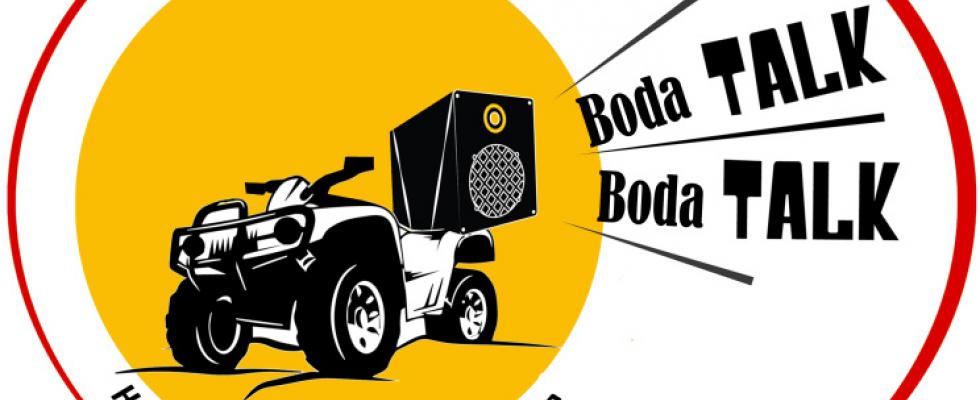
For the 14,000 internally displaced persons (IDPs) living at Tong Ping Protection of Civilians (POC) site in Juba, news and life-saving information circulates not by television or internet, but by boda boda. Broadcast from speakers attached to the backs of motorcycles, Boda Boda Talk Talk responds to IDP needs and addresses challenges in Tong Ping in an innovative, culturally-relevant manner. The Internews program delivers vital information on food, medical assistance, services for women, education opportunities, and family reunification. The program also provides a platform for people to share their views to camp management and incorporates drama pieces into its broadcasts.
The motorbike news service was a creative solution, recognizing that informing people living in displacement camps about basic needs such as survival, security, relocation, reintegration, and reconciliation is “not only a humanitarian imperative, but a fundamental right,” according to the UNHCR’s Guiding Principles on Internal Displacement.
For the majority of South Sudanese, print media is inaccessible as distribution is confined to the national capital and literacy rates are low. According to Internews, this reality makes radio “the most important and widely accessed source of information in South Sudan.” A national media survey reported that 71% of individuals identified radio as their most important news source.
When violent conflict erupted in December 2013, people fled by the thousands onto U.N. bases throughout South Sudan. In the Tong Ping site, a new community, almost entirely of Nuer ethnicity, emerged. The dire humanitarian circumstances made it immediately clear that lack of suitable networks to disseminate life-saving information was impeding aid delivery, contributing to poor health and sanitation habits, and leading to growing tensions within the base. Agencies needed to share information critical to this new community, information which might be dangerous to share beyond the borders of the U.N. base given heightened ethnic tensions in the country. Given the situation and the ethnically-charged nature in which the conflict unfolded in Juba, traditional FM radio was not appropriate, and an alternative method was needed.
In launching its innovative news-on-wheels solution, Internews was one of the first organizations in South Sudan to develop an information delivery strategy customized to the needs of displaced populations. The twice-weekly Boda Boda Talk Talk program is a collaborative effort among humanitarian agencies and community members, with correspondents hired from within the Tong Ping site.
Motorcycles broadcasting from speakers circulate to multiple “Listening Stops” located around the site, where people often wait in long lines in heat and rain to hear the news. Additionally, the tents of three NGOs – Worldwide, Médicins Sans Frontières, and Magna – also operate as listening centers. As of July, 2014, 33 programs have been professionally produced and aired over 125 times across Tong Ping, garnering approximately 200 listeners per day. Boda Boda Talk Talk reports an estimated total of 20,000 listeners since its launch.
Boda Boda Talk Talk provides information that is apolitical, non-religious, and strongly focused on issues pertinent to women and children, the most vulnerable people in Tong Ping. All content is broadcast in Nuer, the language of the majority of displaced inhabitants.
An evaluation of program activities showcased very encouraging results. Internews’ July 2014 report demonstrates how providing information to IDPs in South Sudan can dramatically increase their well-being and safety in the midst of an ongoing conflict. The vast majority of community members found BBTT both applicable and trustworthy, and two-thirds of survey respondents (62.1%) listened frequently. Approximately 70.7% of listeners trusted the information disseminated by the program, and 94.1% reported changing their behavior as a result of BBTT. BBTT has made a positive impact in meeting people’s information needs, in changing people’s overall behavior, and in encouraging discussion among listeners. In regard to health, 77.4% of listeners felt “well informed” about cholera prevention, 66.9% about diarrhoea prevention, and 61.2% about malaria prevention.
The Internews report also makes some recommendations based on listener concerns in order to improve its programming. Frequent listeners felt the program was politically or religiously biased. Additionally, the report recommends spreading Boda Boda broadcasts to more locations at Tong Ping and ensuring effectual coordination of information dissemination among all implementing agencies.
For those sheltering at Tong Ping, displaced by violent conflict and not knowing when they will be able to return home, Boda Boda Talk Talk is providing news and information essential to the continued health, safety, and welfare of the internally displaced persons in Juba.
Photo Credit: Boda Boda Talk Talk, Children listen at a station in Tong Ping protection of civilian area in Juba

